
What’s up, Nomsters! Today, we’re diving into the delicious world of ramen eggs. If you’ve ever found yourself savoring the last bite of these umami-packed delights at your favorite ramen spot, wondering how they achieve such perfection, you’re in the right place.
Get ready, because we’re about to guide you through a step-by-step process of making these heavenly creations right in your own kitchen. Whether you’re a ramen aficionado or just a home cook looking to try something new, this recipe is straightforward, fun, and utterly delicious!
For more egg inspiration, check out our 41 favorite egg recipes for breakfast and brunch!
What are Ramen Eggs (Ajitsuke Tamago or Ajitama)?
Ramen eggs, known as Ajitsuke Tamago (味付け玉子) in Japanese, or simply Ajitama, are a delightful addition to a variety of dishes, but are most famously paired with ramen. These eggs are soft-boiled to perfection, with a runny yet slightly custardy yolk, and a firm but tender white. The magic, however, lies in the marinade. After being boiled, the eggs are marinated in a savory and sweet mixture, usually made of soy sauce, mirin, sake, and sugar. This process infuses the eggs with an umami-rich flavor that is irresistible.
How to Make Ramen Eggs
Quick Steps (Jump Right In)
If you don’t need a detailed run-through, here’s all you need to know to make delicious ramen eggs!
- Prepare the marinade and let it cool.
- Soft boil the eggs and place them in an ice water bath.
- Peel the eggs.
- Marinate the eggs for 24 hours in the refrigerator.
- Enjoy your ramen eggs!
Tips for the Best Ramen Eggs
1) Ensure Proper Cooking of the Marinade
Making certain that your marinade is thoroughly cooked and has had ample time to cool is pivotal. This step guarantees a more effective and thorough infusion of the flavors into the eggs.
2) Introduce Vinegar and Salt During the Boiling Process
A small addition of vinegar and salt to your boiling water can significantly ease the peeling process later on.
3) Opt for Chilled Eggs from the Refrigerator
Utilizing eggs that are chilled, straight from the refrigerator, ensures a more uniform cooking of both the whites and yolk.
4) Precisely Time the Boiling of the Eggs
To secure the perfect texture and consistency, start your timer the instant the first egg hits the boiling water, allowing them to cook for a strict 7 minutes.
5) Promptly Cool the Eggs in an Ice Water Bath
Ensuring that you swiftly move the eggs to an ice water bath not only halts the cooking process but also facilitates an easier peeling process.
6) Allow Adequate Time for Marinating
For the eggs to fully embrace the savory flavors of the marinade, it’s crucial to let them marinate in the refrigerator overnight.
Substitutions
If you’re missing an ingredient or want to try something different, here are some substitutions you can consider:
- Soy Sauce: Try using light soy sauce for a less salty flavor or tamari for a gluten-free option.
- Mirin: If you don’t have mirin, you can use a sweet rice wine or even a dry sherry as a substitute.
- Sake: A dry white wine can work as a replacement if sake is not available.
- Sugar: Feel free to adjust the sugar level according to your taste or try using honey for a different sweetness.
Variations
- Get Creative with the Marinade: This recipe gives you the basic marinade, but feel free to tweak it to your taste. Add in some minced garlic, a sprinkle of shichimi togarashi, or experiment with other flavor combinations to make it your own.
How to Serve Ramen Eggs: Beyond the Traditional
Ramen eggs, or Ajitama, are a versatile and delightful addition to various dishes, enhancing flavors and adding a touch of sophistication. Here are some additional delicious ways to serve and enjoy these savory treats:
1) As a Topping for Donburi (Rice Bowls)
Slice the ramen eggs in half and place them atop a bowl of warm, steamed rice, along with other toppings like grilled chicken, beef, or vegetables. The creamy yolk adds a luxurious texture, making every bite irresistible.
2) Inside a Bento Box
Include a ramen egg in your bento box for a protein-packed addition that is as tasty as it is beautiful. Pair it with rice, pickled vegetables, and your choice of protein for a complete and satisfying meal.
3) On Toast with Avocado and Sriracha
Elevate your avocado toast by adding a sliced ramen egg and a drizzle of sriracha. This combination creates a perfect balance of creamy, spicy, and umami flavors.
4) In a Salad
Add sliced or halved ramen eggs to your salad for an unexpected burst of flavor. They pair wonderfully with greens, roasted vegetables, and a variety of dressings, providing a rich and savory element to the dish.
5) As a Snack with a Drizzle of Sauce
Enjoy ramen eggs on their own as a decadent snack. Cut them in half and drizzle a little extra soy sauce or a sprinkle of sesame seeds on top for an added flavor kick.
6) In a Sandwich or Wrap
Experiment by adding ramen eggs to your favorite sandwich or wrap. Their unique flavor and texture can elevate a simple chicken or turkey sandwich, or add an umami-packed component to a veggie wrap.
7) Alongside Noodles
While ramen is the obvious choice, don’t be afraid to try ramen eggs with other types of noodles. They can be a delightful addition to udon, soba, or even pasta, providing a Japanese twist to Italian flavors.
8) With Fried Rice
Stir fry some rice with vegetables and proteins of your choice, and top it off with a ramen egg. The yolk can mix in with the rice, creating a creamy and flavorful experience.
9) As a Topping for Soup
Place a ramen egg atop a bowl of your favorite soup. Whether it’s a clear broth or a hearty stew, the egg will add a layer of richness and flavor.
10) With Grilled Vegetables
Pair ramen eggs with grilled vegetables for a light yet satisfying meal. The charred flavor of the vegetables complements the savory sweetness of the egg, creating a harmonious dish.
How to Store Ramen Egg Leftovers
If you have any leftover eggs, you can store them in the fridge for up to 3 days. If you hard boil the eggs, you can store them for up to 5 days, but it’s just not the same when you prepare them that way, in our opinion.
Ingredients
- 4 large eggs
- ¼ cup soy sauce
- ¼ cup mirin
- ¼ cup sake
- 2 tsp sugar
Instructions
Here’s the full walkthrough so you can make ajitsuke tamago like a pro!
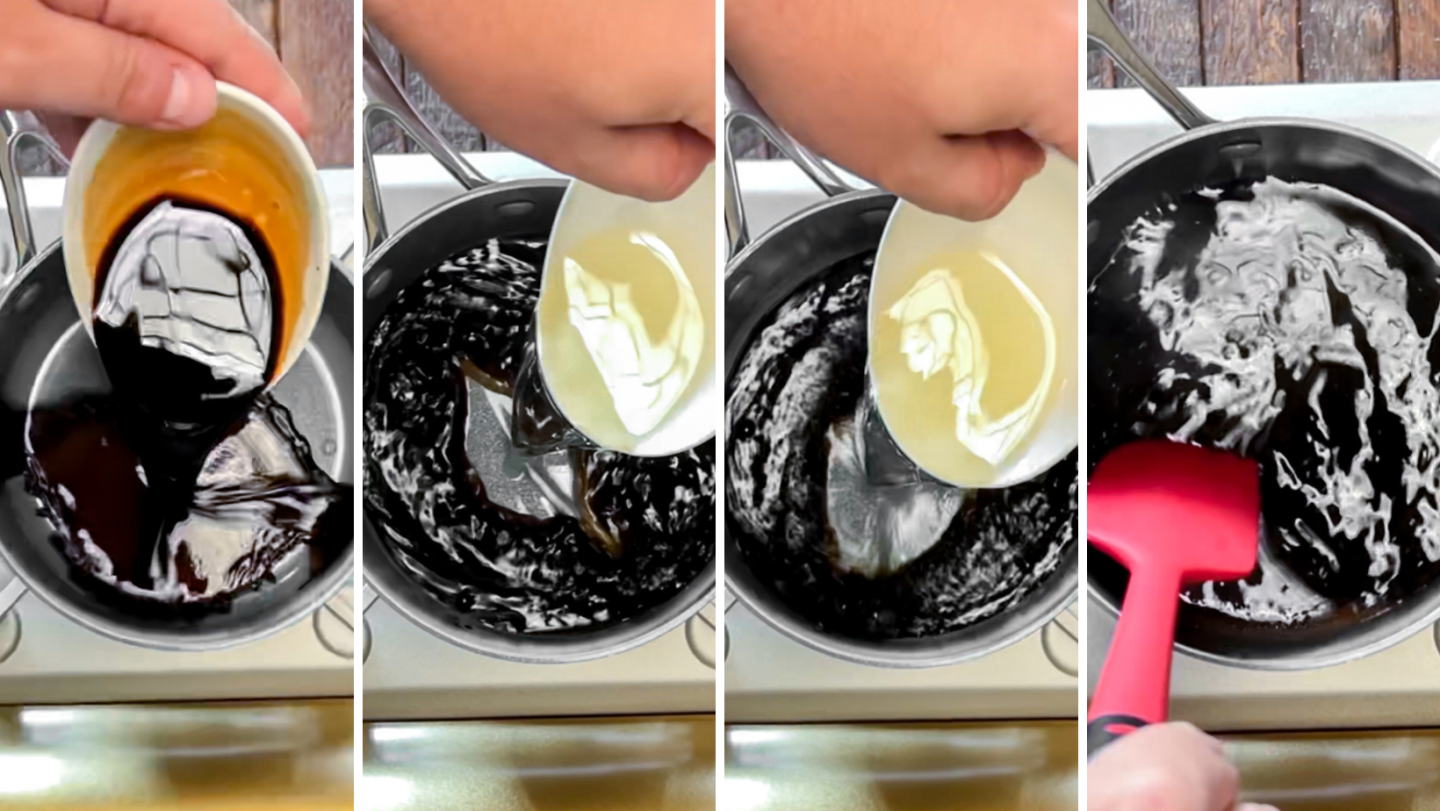
Step 1: Prepare the Marinade
In a small saucepan, combine the sake, mirin, soy sauce, and sugar. Heat the mixture on medium-low, stirring occasionally, for about 30 seconds to a minute. You just want to give the ingredients a chance to mingle and the sugar a chance to dissolve. Once everything’s happy and acquainted, remove the saucepan from the heat and set it aside to cool.
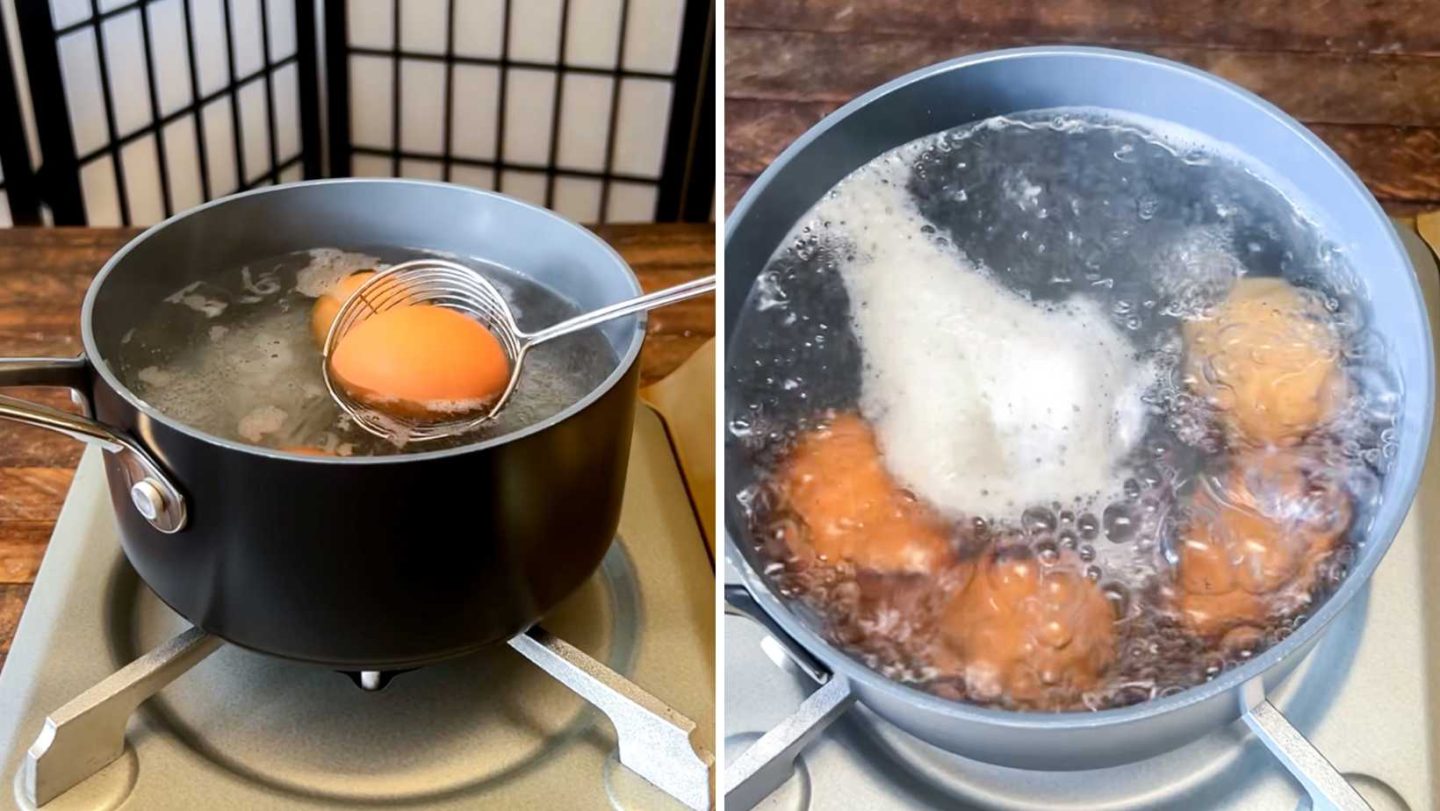
Step 2: Boil the Eggs
Bring a pot of water to a light boil. Carefully lower the eggs into the boiling water and let them cook for 6 ½ minutes. This precise timing will give you that dreamy, custard-like yolk we’re after.
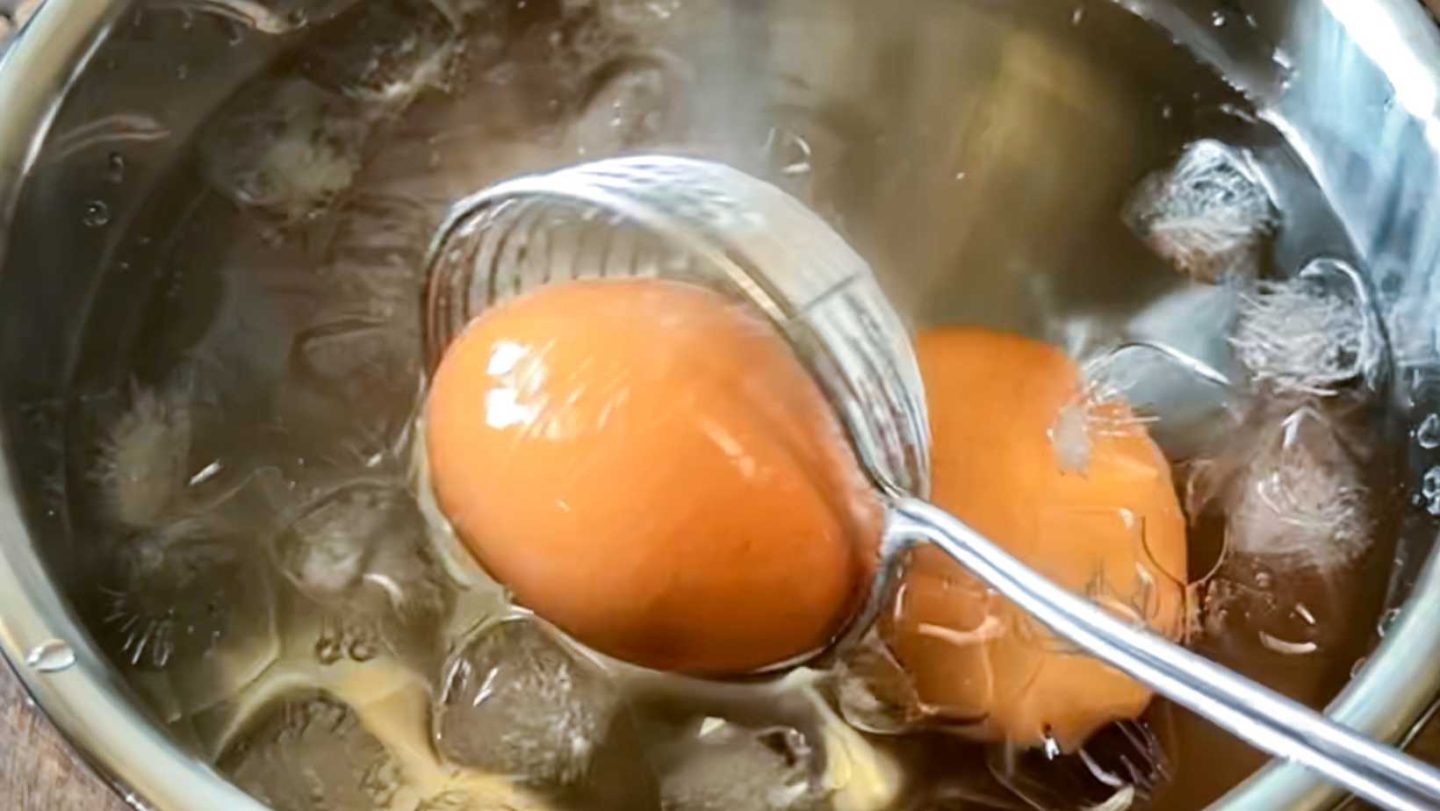
Step 3: Ice Bath
Once the eggs have boiled, use a slotted spoon to immediately transfer them into a bowl of ice water. Let them chill out there for about 15 minutes, or until they’re completely cool to the touch. This stops the cooking process so the yolks don’t cook through and makes the eggs easier to peel.

Step 4: Peel the Eggs
When the eggs are cool, gently peel off the shells. Take your time here – we want those eggs to look as beautiful as they taste!
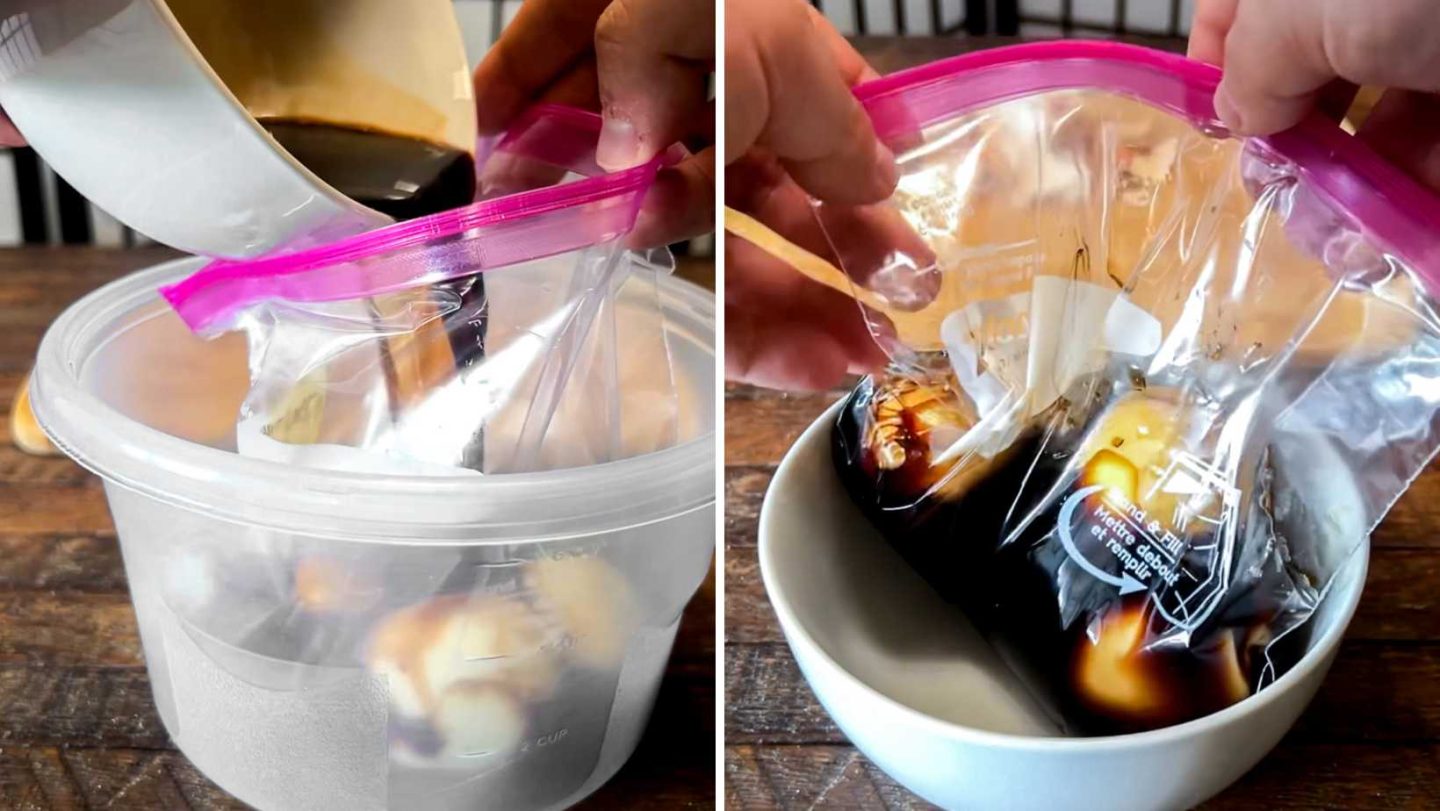
Step 5: Marinate the Eggs
Now, back to the marinade! Pour the cooled marinade into a medium-sized Ziploc bag, and then add the peeled eggs. Squeeze out as much air as possible and seal the bag. For an extra snug fit, you can use a clip to tighten the bag, ensuring that the eggs are fully submerged in the marinade.
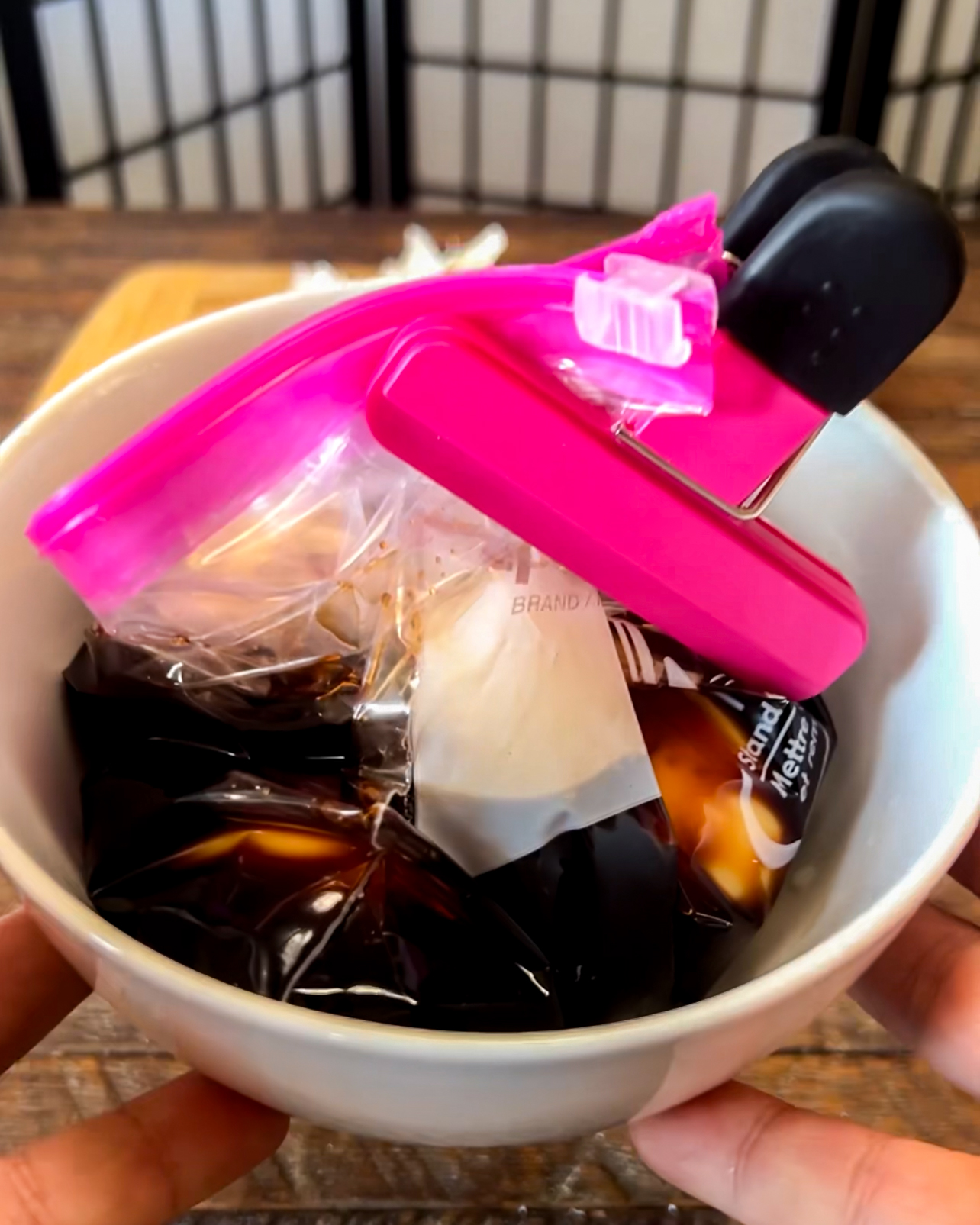
Step 6: Refrigerate
Place the bag in a small bowl or Tupperware to prevent any potential mess, and pop it in the fridge. Let the eggs marinate for 24 hours to allow all those flavors to fully penetrate and transform them into the savory-sweet gems we love.

Step 7: Enjoy!
After 24 hours, your ramen eggs are ready to be enjoyed! Slice them in half and marvel at the magic that is the perfectly cooked ramen egg. Serve them with a bowl of ramen, atop a mound of rice and spam, or even on some avocado toast. Or, simply enjoy them on their own as a delightful snack!

Final Thoughts
Congrats, yall! You’ve just made restaurant-quality ramen eggs at home. We hope this recipe brings a little bit of culinary joy to your kitchen and leaves you feeling like a ramen master. Don’t forget to share your creation on social media and tag us – we can’t wait to see how your eggs turned out and hear what delicious pairings you’ve come up with!
Happy cooking, and enjoy your ajitama! 😊
